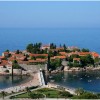 (Podgorica, 25 January 2012) – The subsidized secret journey of Prime Minister Igor Lukšić, his ministers and their wives is an additional controversy that accompany the leasing of Hotel Sveti Stefan, Miločer and the Queen’s Beach. They add to allegations that the alleged strategic partner in this deal enjoys a privileged status with the Government of Montenegro.
(Podgorica, 25 January 2012) – The subsidized secret journey of Prime Minister Igor Lukšić, his ministers and their wives is an additional controversy that accompany the leasing of Hotel Sveti Stefan, Miločer and the Queen’s Beach. They add to allegations that the alleged strategic partner in this deal enjoys a privileged status with the Government of Montenegro.
That is, while the Prime Minister suggested that while he was in Morocco he was encouraging investments in our tourism sector, those same investors at whose expense he stayed in this Mediterranean location, have continually been violating leasing agreements for the hotels already mentioned (while simultaneously seeking better conditions for their business interests in Montenegro).
In May 2011, Lukšić’s government signed two annexes to leasing agreements that once again delayed the opening of these hotels and allowed such a lease to be transfered to third parties. The extended deadline for finishing work and opening Hotel Sveti Stefan ran out on July 15th of last year, a deadline that obviously wasn’t respected. Since the entry of foreign partners in Sveti Stefan, not a single violation of the agreement was sanctioned adequately. Moreover, the Government of Igor Lukšić had countless opportunities to terminate the contract, none of which were acted upon, nor has the government ever warned the investor of its failure to meet these obligations.
The government has nevertheless guaranteed credits worth €37-million from the EBRD, and committed to recovering this sum from the investor by charging the rates that the investor pays. Bearing in mind that the investor now owes around one million euros for rent, it is likely that the loan will be returned by taxpayers.
The investment into these hotels and related construction projects is also burdened by multiple violations of the law, where the Government and competent inspectors have tolerated illegal construction and the devastation of the local environment for months.
Namely, the Greek company “Adriatic Properties” began reconstruction of a hotel in Sveti Stefan in late 2009, while the permit for this was issued in May 2010. This means that for more than half a year, work was illegally carried out on this famous peninsula. That same year, “Adriatic Properties” illegally erected two buildings for a hotel service in Miločer Park, for which the Inspectorate for Environmental Protection adopted a demolition order in May 2010 (which was never implemented).
Rather than enforcing the law and demolishing these illegally built objects, the Municipality of Budva immediately adopted a resolution that granted the status of “temporary buildings” to those built out of hard materials. This decision essentially legalized these illegally built objects. Municipal functionaries at the time publicly declared that they decided on these measures due to the “requests of investors,” and that they “had received concrete requests from the Government as well, given that it is also a signatory of these leasing agreements.”
Unfortunately, all of the above suggests that in the case of Aman Resorts and the Greek investor there is an organized attempt by the Government of Montenegro to meet all of their interests, even to the point of ignoring existing laws and regulations. Annexes, temporary permits, and amendments to existing plans are some of the mechanisms used by the Lukšić’s government to minimize concrete criminal acts committed in and around Sveti Stefan.
The Supreme State Prosecutor has not reacted even once in the Sveti Stefan case, whether for violations of existing contractual obligations, illegal construction, or suspicious financial transactions. The question is posed once again as to whether this affair should be dealt with by competent authorities of another state in order for Lukšić to act (as happened in the case of Montenegrin Telecom’s privatization).
Dejan Milovac
Deputy Executive Director



